Each February, the Career Technical Education (CTE) community celebrates CTE Month to raise awareness of opportunities and impact achieved for every learner and leader through its programs.
This year’s CTE Month celebrations showcased the continued significance and success of CTE across the nation. Below, you’ll find highlights from this month, featuring events from states, partners, policymakers, and other champions of CTE!
Federal CTE Champions
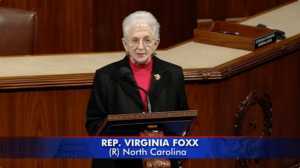
On February 8, Education and the Workforce Committee Chair Virginia Fox (R-NC) spoke on the House Floor to celebrate CTE Month, stating, “By equipping students with the competencies they need to be successful on the job, career and technical education programs give participants an invaluable head start.” Watch here
Representatives Glenn Thompson (R-PA) and Suzanne Bonamici (D-OR) Recognize February as Career and Technical Education Month
Co-chairs of the Congressional Career and Technical Education Caucus Reps. Thompson and Bonamici spoke on the importance of career technical education on Capitol Hill. Watch on C-SPAN Read the press release
State CTE Champions
Arkansas CTE Day at the Capitol
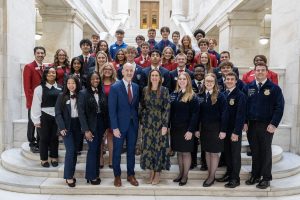
Throughout the month of February, Arkansas held regional CTE showcases to highlight local programs that serve as a bridge between K-12 and higher education, with the first one taking place at the Capitol Rotunda alongside Arkansas Governor Sarah Huckabee Sanders. Read the full press release
Maine’s CTE Month Showcase
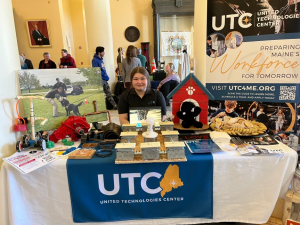 Maine kicked off Career and Technical Education (CTE) Month at the State House with a showcase featuring learners, instructors, and directors from 15 of the state’s 27 CTE centers. The showcase featured learners’ advanced skills in areas from biotechnology and hospitality to welding and graphic design. Notably, every instructor and director at the event reported an increase in “non-traditional students” participating in CTE programs. Read more about the kick-off
Maine kicked off Career and Technical Education (CTE) Month at the State House with a showcase featuring learners, instructors, and directors from 15 of the state’s 27 CTE centers. The showcase featured learners’ advanced skills in areas from biotechnology and hospitality to welding and graphic design. Notably, every instructor and director at the event reported an increase in “non-traditional students” participating in CTE programs. Read more about the kick-off
CTE Champions in Schools
Secretary of Education Cardona Joins President Biden’s Investing in America Tour
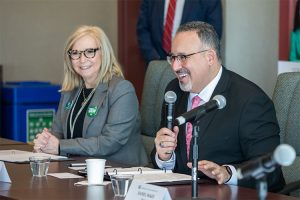 On February 21, U.S. Secretary of Education Miguel Cardona visited the Community College of Rhode Island (CCRI) as part of President Biden’s Investing in America Tour. The visit featured a tour of CCRI’s advanced manufacturing lab, a roundtable discussion with educational leaders, and dialogues with learners. Additional discussions took place with CCRI’s President Rosemary Costigan, Rhode Island Governor Dan McKee, and U.S. Representative Gabe Amo.
On February 21, U.S. Secretary of Education Miguel Cardona visited the Community College of Rhode Island (CCRI) as part of President Biden’s Investing in America Tour. The visit featured a tour of CCRI’s advanced manufacturing lab, a roundtable discussion with educational leaders, and dialogues with learners. Additional discussions took place with CCRI’s President Rosemary Costigan, Rhode Island Governor Dan McKee, and U.S. Representative Gabe Amo.
Cardona applauded CCRI’s intentional alignment of education with workforce needs, especially with the state’s Latine population as a Hispanic-Serving Instituion. The event demonstrated Rhode Island’s commitment to inclusive and high-quality CTE programs that serve both learner and industry – “I wanted a new career path, something where I could earn my diploma and show my kids it’s not too late to go back…I had my kids at a young age and was always focused on providing and making sure they had what they needed before I could go back to school. To finish will be a big accomplishment, not just for me but for them, too” said Fredy Vasquez, 38, a learner in the Advanced Manufacturing and Design degree program. Read more about Cardona’s visit and CCRI
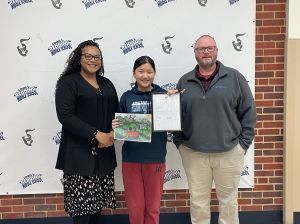 DACCTE Celebrates Poster Contest Winner
DACCTE Celebrates Poster Contest Winner
Delaware Advisory Council on Career and Technical Education (DACCTE), along with partners from the Department of Labor and Department of Education hosted a poster contest to showcase the talent represented in CTE classrooms every day. The winning poster was used to celebrate CTE Month in Delaware. Read more on DACCTE’s CTE Month activities
CTE Champions on Social Media
#ThisisCTE Social Media Campaign
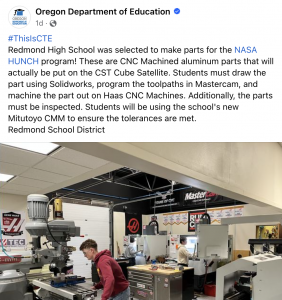 The Oregon CTE Youth Advisory Council launched a #ThisIsCTE social media campaign to highlight CTE programs and initiatives across the state and increase CTE awareness. View on Facebook | View on X (Twitter)
The Oregon CTE Youth Advisory Council launched a #ThisIsCTE social media campaign to highlight CTE programs and initiatives across the state and increase CTE awareness. View on Facebook | View on X (Twitter)
MSDE CTE Month Myth Busting
The Maryland State Department of Education (MDSE) conducted a social media campaign dispelling common myths about CTE.
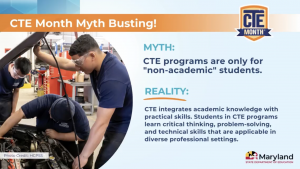
To continue to advocate for CTE year-round, explore our resources to reach learners, families, employers, and policymakers:
- Engage Families & Learners – Advance CTE
- Communicating the Value of Career Technical Education to Employers – Advance CTE
- Engaging Policymakers – Advance CTE
…and follow us on LinkedIn for the latest on CTE information, resources, research and more!


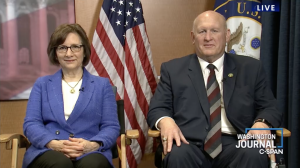
 This week the House Education and Workforce (E&W) Committee marked up and advanced
This week the House Education and Workforce (E&W) Committee marked up and advanced  Chairman Todd Rokita (R-IN) in his
Chairman Todd Rokita (R-IN) in his